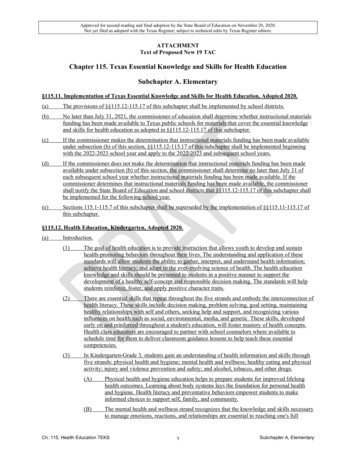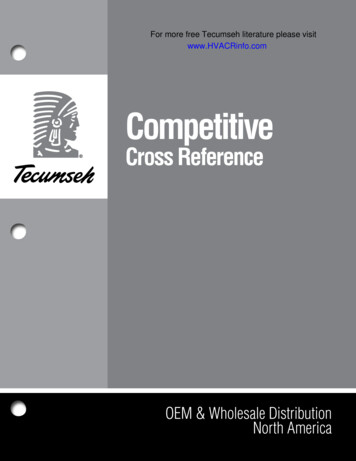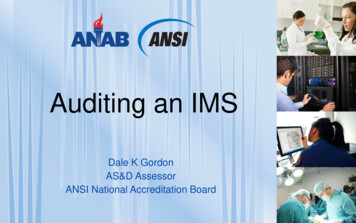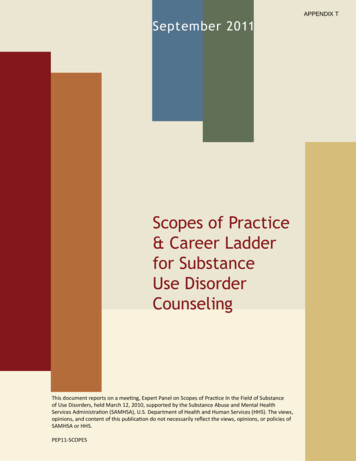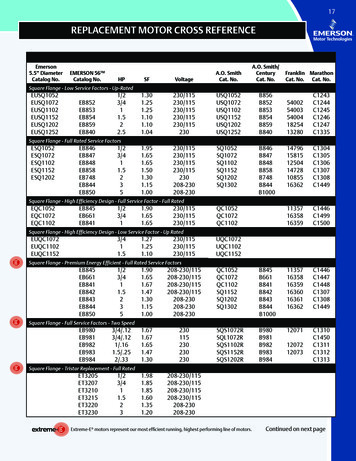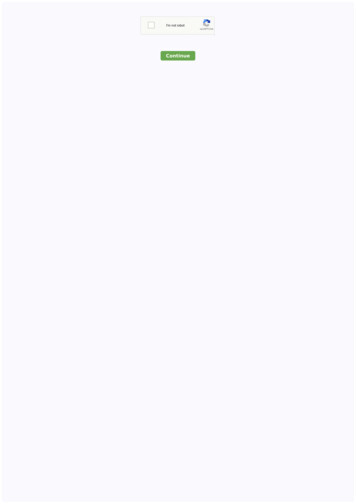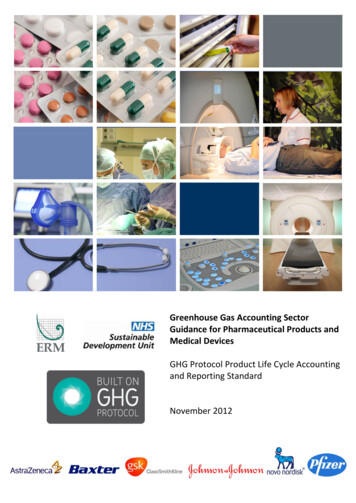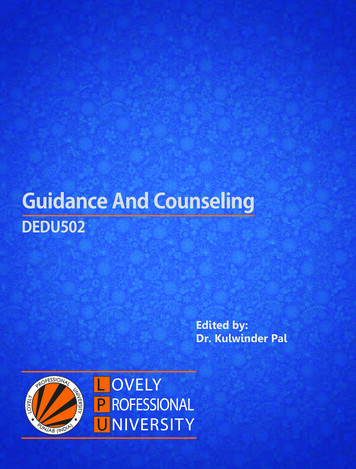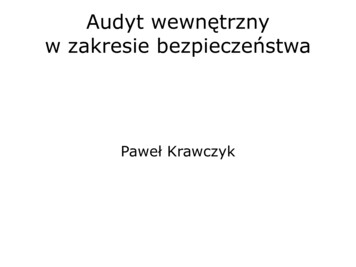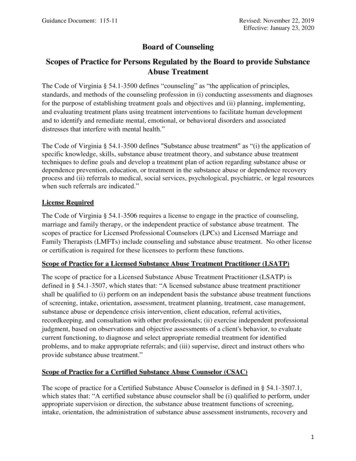
Transcription
Guidance Document: 115-11Revised: November 22, 2019Effective: January 23, 2020Board of CounselingScopes of Practice for Persons Regulated by the Board to provide SubstanceAbuse TreatmentThe Code of Virginia § 54.1-3500 defines “counseling” as “the application of principles,standards, and methods of the counseling profession in (i) conducting assessments and diagnosesfor the purpose of establishing treatment goals and objectives and (ii) planning, implementing,and evaluating treatment plans using treatment interventions to facilitate human developmentand to identify and remediate mental, emotional, or behavioral disorders and associateddistresses that interfere with mental health.”The Code of Virginia § 54.1-3500 defines "Substance abuse treatment" as “(i) the application ofspecific knowledge, skills, substance abuse treatment theory, and substance abuse treatmenttechniques to define goals and develop a treatment plan of action regarding substance abuse ordependence prevention, education, or treatment in the substance abuse or dependence recoveryprocess and (ii) referrals to medical, social services, psychological, psychiatric, or legal resourceswhen such referrals are indicated.”License RequiredThe Code of Virginia § 54.1-3506 requires a license to engage in the practice of counseling,marriage and family therapy, or the independent practice of substance abuse treatment. Thescopes of practice for Licensed Professional Counselors (LPCs) and Licensed Marriage andFamily Therapists (LMFTs) include counseling and substance abuse treatment. No other licenseor certification is required for these licensees to perform these functions.Scope of Practice for a Licensed Substance Abuse Treatment Practitioner (LSATP)The scope of practice for a Licensed Substance Abuse Treatment Practitioner (LSATP) isdefined in § 54.1-3507, which states that: “A licensed substance abuse treatment practitionershall be qualified to (i) perform on an independent basis the substance abuse treatment functionsof screening, intake, orientation, assessment, treatment planning, treatment, case management,substance abuse or dependence crisis intervention, client education, referral activities,recordkeeping, and consultation with other professionals; (ii) exercise independent professionaljudgment, based on observations and objective assessments of a client's behavior, to evaluatecurrent functioning, to diagnose and select appropriate remedial treatment for identifiedproblems, and to make appropriate referrals; and (iii) supervise, direct and instruct others whoprovide substance abuse treatment.”Scope of Practice for a Certified Substance Abuse Counselor (CSAC)The scope of practice for a Certified Substance Abuse Counselor is defined in § 54.1-3507.1,which states that: “A certified substance abuse counselor shall be (i) qualified to perform, underappropriate supervision or direction, the substance abuse treatment functions of screening,intake, orientation, the administration of substance abuse assessment instruments, recovery and1
Guidance Document: 115-11Revised: November 22, 2019Effective: January 23, 2020relapse prevention planning, substance abuse treatment, case management, substance abuse ordependence crisis intervention, client education, referral activities, record keeping, andconsultation with other professionals; (ii) qualified to be responsible for client care of personswith a primary diagnosis of substance abuse or dependence; and (iii) qualified to supervise,direct and instruct certified substance abuse counseling assistants. Certified substance abusecounselors shall not engage in independent or autonomous practice. ”Facilitation or participation in “planned interventions” by Certified Substance Abuse Counselorsis within the scope of their practice as long as they are practicing under supervision as requiredby law and regulation.Scope of Practice for a Certified Substance Abuse Counselor Assistant (CSAC-A)The scope of practice for Certified Substance Abuse Counselor Assistants is defined in § 54.13507.2, which states that: “A certified substance abuse counseling assistant shall be qualified toperform, under appropriate supervision or direction, the substance abuse treatment functions oforientation, implementation of substance abuse treatment plans, case management, substanceabuse or dependence crisis intervention, record keeping, and consultation with otherprofessionals. Certified substance abuse counseling assistants may participate in recovery groupdiscussions, but shall not engage in counseling with either individuals or groups or engage inindependent or autonomous practice.”Scope of Practice for a Peer Recovery SpecialistCode of Virginia § 54.1-3500 defines a peer recovery specialist is “a person who by educationand experience is professionally qualified in accordance with 12VAC35-20 to providecollaborative services to assist individuals in achieving sustained recovery from the effects ofmental illness, addiction, or both. A registered peer recovery specialist (RPRS) shall providesuch services as an employee or independent contractor of DBHDS, a provider licensed byDBHDS, a practitioner licensed by or holding a permit issued from the Department of HealthProfessions, or a facility licensed by the Department of Health.”A peer recovery specialist offers support and assistance in helping others in the recovery andcommunity-integration process.Clarifying InformationThe scope of practice for CSACs includes substance abuse counseling with individuals andgroups. The Code of Virginia § 54.1-3507.1 indicates that CSACs are “qualified to beresponsible for client care of persons with a primary diagnosis of substance abuse ordependence.” Providing counseling to persons for a mental health diagnosis other than substanceabuse or dependency is outside the scope of practice for CSACs.A “diagnostic” assessment and a “multidimensional” assessment, conducted according to criteriaof the American Society of Addiction Medicine, are both required for Medicaid reimbursementfor services. CSACs are not allowed to do a diagnostic assessment but are allowed to do the2
Guidance Document: 115-11Revised: November 22, 2019Effective: January 23, 2020multidimensional assessment to make recommendations for a level of care that must then besigned off on or approved by a licensed professional who is supervising the CSAC.The Board of Counseling interprets the function of “record keeping” to include the gathering ofdemographic information. CSAC-As can perform this function as within their scope of practice.However, CSAC-As cannot perform the function of intake or screening. Only a CSAC, LSATP,LPC, or LMFT shall perform these functions.3
Guidance Document: 115-11Revised: November 22, 2019Effective: January 23, 2020Scopes of Practice for Persons Regulated by the Board of Counseling to provide SubstanceAbuse TreatmentProvide Substance Abuse TreatmentIndependentlyPerform only under supervision of LicensedMental Health on of Substance Abuse AssessmentInstrumentsRecovery and relapse Prevention PlanningDiagnostic AssessmentMultidimensional AssessmentTreatment PlanningSubstance Abuse TreatmentImplementation of Substance Abuse TreatmentPlansCase ManagementSubstance Abuse or dependence crisisinterventionClient EducationReferral ActivitiesRecordkeepingConsultation with other ProfessionalsExercise Independent Professional Judgment,to evaluate current functioningExercise Independent Professional Judgment todiagnose and select appropriate remedialtreatment for identified problemsExercise Independent Professional judgment tomake appropriate referralsSupervise, Direct and Instruct others whoprovide Substance Abuse TreatmentProvide Independent Substance AbuseCounselingProvide counseling to persons with for a MentalHealth Diagnosis other than Substance AbuseCoordinate, Facilitate, Participate in RecoveryGroup DiscussionsLead Recovery Group DiscussionsSubstance Abuse Counseling with IndividualsSubstance Abuse Counseling with GroupsLPC LMFT NoYesYesYesNoYesYesYesYes esYesYesYesYesYesYesYesYesYesYesNoNoNoNo4
Guidance Document: 115-11Revised: November 22, 2019Effective: January 23, 2020Supervision Requirements for Persons Providing Substance Abuse Treatment Pursuant to Code ofVirginia 54.1-3500 ApplicantCSAC-ACSAC-AApplicantYesYesNo (Mustpractice undersupervision)No (Mustpractice undersupervision)No (Mustpractice undersupervision)No (Mustpractice undersupervision)No (Mustpractice undersupervision)Authority toSupervise, Direct, orInstructYesYesNoRequired to be under theSupervision of:Only CSAC-As andCSAC ApplicantsLSATP or LMHPNoLSATP, LMHP, or CSACNoLSATP, LMHP, or CSACNoLSATP, LMHP, or CSACNot requiredNot requiredLSATP or LMHP*LMHP means a Licensed Mental Health Provider and includes Licensed Professional Counselors (LPCs), LicensedMarriage and Family Therapists (LMFTs), Licensed Clinical Psychologists (LCPs), and Licensed Clinical SocialWorkers (LCSWs)5
Scopes of Practice for Persons Regulated by the Board to provide Substance Abuse Treatment The Code of Virginia § 54.1-3500 defines "counseling" as "the application of principles, . for the purpose of establishing treatment goals and objectives and (ii) planning, implementing,
